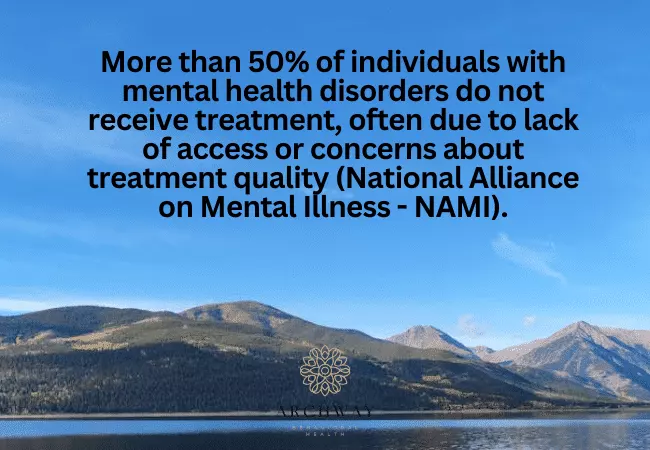When seeking help for mental health challenges, finding the right Mental Health Treatment Center is crucial. With many facilities offering mental health treatment services, it’s important to choose one that meets the highest standards of care. One of the most reliable ways to ensure quality treatment is by selecting an accredited mental health facility.
Accreditation is a seal of approval given to mental health and addiction treatment centers that meet rigorous national and state standards. It ensures that a facility provides safe, effective, and evidence-based care for individuals struggling with conditions such as anxiety, depression, trauma, and bipolar disorder.
At Archway Behavioral Health, we are committed to exceeding industry standards by providing comprehensive mental health treatment services, including Dialectical Behavioral Therapy (DBT), Cognitive Behavioral Therapy (CBT), Partial Hospitalization Programs (PHP), Intensive Outpatient Programs (IOP), and Trauma Treatment Programs.
This guide explores:
- Why accreditation matters in mental health treatment
- The different types of accreditation and what they mean
- How accreditation impacts patient care and treatment success
- What to look for when choosing a mental health treatment center
Why Accreditation Matters in Mental Health Treatment
Accreditation in mental health treatment is not just a formality—it’s a guarantee that a facility has undergone a thorough evaluation of its clinical practices, treatment methods, and patient safety protocols.
1. Ensures High Standards of Care
Accredited mental health facilities must meet strict guidelines for:
- Licensed medical and clinical staff who are properly trained to handle mental health disorders.
- Evidence-based treatment programs such as CBT, DBT, and trauma-informed care.
- Ethical treatment practices that put patient well-being first.
2. Increases Treatment Effectiveness
Research shows that patients receiving care at accredited mental health facilities have higher success rates in recovery compared to those in non-accredited centers. Accreditation ensures that:
- Therapies are research-backed and clinically effective.
- Treatment plans are individualized based on a patient’s needs.
- Facilities provide ongoing monitoring and follow-up care to reduce relapse rates.
3. Protects Patient Safety and Rights
Accreditation agencies require mental health centers to:
- Follow strict safety protocols for medication management, crisis intervention, and suicide prevention.
- Adhere to patient confidentiality and HIPAA regulations.
- Provide a safe and ethical treatment environment with well-trained professionals.
Types of Accreditation for Mental Health Treatment Centers
Several national organizations provide accreditation for mental health and substance use treatment facilities. Each accrediting body has strict criteria that ensure high-quality treatment.
1. The Joint Commission (JCAHO)
The Joint Commission is one of the most recognized accrediting bodies for mental health and addiction treatment centers. Facilities accredited by JCAHO must meet:
- High standards for clinical care and patient safety.
- Proven treatment effectiveness through data-driven evaluations.
- Rigorous assessments of staff qualifications and facility operations.
2. Commission on Accreditation of Rehabilitation Facilities (CARF)
CARF-accredited facilities must:
- Provide individualized treatment plans that focus on long-term patient recovery.
- Maintain structured, evidence-based programs such as PHP and IOP.
- Conduct regular staff training and program evaluations to improve care.
3. LegitScript Certification
LegitScript is a verification service that ensures mental health and addiction treatment centers operate legally and ethically. Facilities with this certification have passed:
- Background checks and business verifications.
- Regulatory compliance checks to prevent fraudulent practices.
4. State Licensing and Accreditation
Every state requires mental health centers to meet specific licensing requirements for operation. Facilities that hold state accreditation have demonstrated compliance with:
- Medical and clinical licensing laws.
- Safety and ethical standards for patient care.
- Annual inspections and regulatory oversight.
Choosing a facility that holds multiple accreditations ensures that patients receive the highest quality care available.
How Accreditation Impacts Mental Health Treatment Success
Accreditation directly influences patient recovery, treatment effectiveness, and long-term mental wellness. Here’s how:
1. Ensures Access to Evidence-Based Therapies
Accredited mental health centers use proven treatment methods such as:
- Cognitive Behavioral Therapy (CBT) to address negative thought patterns.
- Dialectical Behavioral Therapy (DBT) to improve emotional regulation.
- Trauma Therapy Programs to help individuals heal from past experiences.
These therapies have been scientifically validated to reduce symptoms of anxiety, depression, PTSD, and bipolar disorder.
2. Provides a Structured Continuum of Care
Accredited facilities offer multiple levels of care to meet each patient’s needs, including:
- Partial Hospitalization Program (PHP): A structured, full-day treatment program for individuals needing intensive care.
- Intensive Outpatient Program (IOP): A flexible program with therapy sessions several times per week.
- Outpatient Therapy: Ongoing individual and group therapy to maintain long-term recovery.
This continuum of care ensures patients receive support at every stage of their recovery journey.
3. Improves Patient Satisfaction and Outcomes
Studies show that patients who receive treatment at accredited facilities report higher satisfaction and greater long-term recovery success. This is because accredited centers prioritize:
- Patient-centered care tailored to individual needs.
- Therapist-to-patient ratios that allow for personalized attention.
- Ongoing quality improvement initiatives to enhance treatment services.
What to Look for When Choosing a Mental Health Treatment Center
Finding the right Mental Health Treatment Center can be overwhelming, but looking for key factors can help:
1. Verify Accreditation and Licensing
Before selecting a treatment center, confirm that it is accredited by JCAHO, CARF, or state health departments.
2. Check for Evidence-Based Treatment Programs
A reputable facility should offer:
- CBT and DBT for anxiety and depression.
- Trauma Therapy Programs for PTSD recovery.
- PHP and IOP options for structured care.
3. Evaluate the Facility’s Approach to Care
The best mental health centers focus on holistic, individualized treatment plans that incorporate:
- Medication management (if necessary).
- Therapy sessions tailored to patient needs.
- A long-term recovery plan to prevent relapse.
4. Read Patient Reviews and Testimonials
Hearing from past patients can give insight into treatment effectiveness, staff quality, and overall patient experience.
Find Accredited Mental Health Treatment at Archway Behavioral Health
At Archway Behavioral Health, we are fully accredited and committed to delivering high-quality mental health care. Our evidence-based Mental Health Treatment Services include:
- Comprehensive Anxiety and Depression Treatment Programs
- Dialectical Behavioral Therapy (DBT) and Cognitive Behavioral Therapy (CBT)
- Structured Partial Hospitalization Program (PHP) and Intensive Outpatient Program (IOP)
- Specialized Trauma Treatment Programs
Call Archway Behavioral Health at 888.488.4103 for a confidential consultation. Choosing an accredited Mental Health Treatment Center is the key to lasting recovery, emotional stability, and a brighter future. Let Archway Behavioral Health be your partner in healing.
At Archway Behavioral Health, we are committed to providing trusted, accredited mental health services designed to help individuals overcome anxiety, depression, trauma, and co-occurring disorders. Our Partial Hospitalization Program (PHP), Intensive Outpatient Program (IOP), and specialized Trauma Treatment Programs offer the structure, expertise, and compassionate care needed for long-term healing.
Choose Accredited Care for a Healthier, Brighter Future
When it comes to mental health treatment, quality, safety, and effectiveness matter. Choosing an accredited Mental Health Treatment Center ensures that you or your loved one receives the highest standard of care, evidence-based therapies, and comprehensive support for lasting recovery.
Accreditation is more than a credential—it’s a commitment to excellence, patient safety, and successful outcomes. Choose trusted, accredited mental health care at Archway Behavioral Health, where your recovery is our priority.
FAQ About Mental Health Treatment Center Accreditation
What does it mean when a mental health treatment center is accredited?
Accreditation means that a mental health treatment facility has met high-quality standards for patient care, treatment effectiveness, and safety set by national regulatory organizations. Accredited centers follow evidence-based practices and maintain strict clinical and ethical guidelines to ensure effective mental health care.
Why is accreditation important when choosing a Mental Health Treatment Center?
Accredited treatment centers provide high-quality mental health services, including individualized therapy, structured programs (PHP & IOP), and evidence-based treatments like Cognitive Behavioral Therapy (CBT) and Dialectical Behavioral Therapy (DBT). Choosing an accredited center ensures safe, ethical, and effective treatment.
What are the main accrediting organizations for mental health treatment centers?
The top accrediting organizations include:
- The Joint Commission (JCAHO) – Recognized for setting high standards in patient care and treatment quality.
- Commission on Accreditation of Rehabilitation Facilities (CARF) – Ensures facilities provide individualized, outcome-driven treatment.
- LegitScript Certification – Verifies that a facility operates legally and ethically in mental health and addiction treatment.
How does accreditation improve mental health treatment outcomes?
Accredited facilities follow strict guidelines to ensure treatment success, leading to:
- Higher patient satisfaction and long-term recovery rates.
- Use of proven therapies like CBT, DBT, and trauma-informed care.
- Better staff training, clinical oversight, and patient safety measures.
What types of treatment programs should an accredited mental health center offer?
A reputable Mental Health Treatment Center should provide a full continuum of care, including:
- Partial Hospitalization Program (PHP) – Intensive, full-day treatment for individuals needing structured support.
- Intensive Outpatient Program (IOP) – Flexible therapy sessions several times per week for continued recovery.
- Trauma Treatment Program – Specialized care for PTSD, childhood trauma, and emotional distress.
- Anxiety & Depression Treatment Programs – Personalized plans for emotional stability and long-term healing.
Can I verify if a treatment center is accredited?
Yes, you can check a facility’s accreditation by:
- Visiting the accrediting organization’s website (such as JCAHO or CARF).
- Looking for accreditation logos and certifications on the treatment center’s website.
- Calling the facility directly to ask about their licensing and accreditation status.
Does accreditation affect insurance coverage for mental health treatment?
Yes, many insurance providers require treatment centers to be accredited before covering the cost of services. An accredited facility is more likely to work with insurance companies and offer financing options for PHP, IOP, and outpatient programs.



